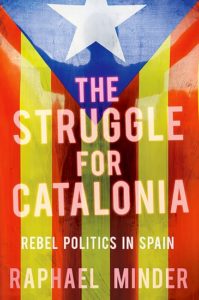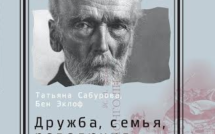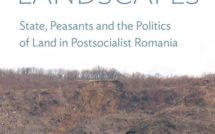
 The Struggle for Catalonia
The Struggle for Catalonia
by Raphael Minder
Publisher: Hurst
Recommended by Louie Dean Valencia-García
New York Times correspondent Raphael Minder’s new book, The Struggle for Catalonia, ultimately tells us more about present-day debates surrounding Catalunya’s independence than it does the history of Catalan struggle. I recommend it not because it provides new insight into Catalan nationalism, let alone its history, but because the book reflects, more generally, why outside international observers are hesitant to take a side, and perhaps why the European Union itself also sits in the back of the room, metaphorically speaking, waiting to see how the struggle plays out. Written before Catalunya’s recent declaration of independence, and subsequent dissolution of the Catalan government by Madrid, in his conclusion, Minder hedges his bets, claiming, “At the time of finishing this book, Catalonia’s independence appears out of reach. But I no longer believe in labelling any political or social change as impossible.” These concluding thoughts lie at the heart of Minder’s journalistic approach in writing this book—bouncing between political figures, polls, and opinions, attempting to show a mostly two-sided perspective to the situation in Catalunya.
Perhaps unintentionally, the book is best read when intended as guide for the uninitiated to understand the complexity of Catalan independence political rhetoric today, only dipping its toe ever so slightly into the Francoist past. For this reason, The Struggle for Catalonia should not be read alone, but in conjunction with works such as Hank Johnston’s Tales of Nationalism: Catalonia, 1939-1979 or Kenneth McRoberts’ Catalonia: Nation Building without a State. After having read either of those books, Minder’s work makes more sense. Minder presents what is essentially a journalistic account of the growth of the Catalan independence movement in the wake of the 2008 economic crisis. Despite equating anarchism with violence, particularly odd given the prevalence and success of non-violent anarcho-syndicalism in Catalunya in the 1930s, as well as today, and claiming that Spain joined the European Union in 1986, before the E.U. was even officially formalized as such, the work does describe much of the political debate in the press today surrounding the struggle over the destiny of Catalunya. The book is successful as a first draft of history.
The Reformer: How One Liberal Fought to Preempt the Russian Revolution
by Stephen Williams
Publisher: Encounter Books
Recommended by Samantha Lomb
This book, written by legal scholar Stephen Williams, uses a biographic account of the life and career of Vasily Maklakov to explore issues of legality and rule of law in Tsarist Russia from 1905, following the promulgation of the October Manifesto, which established a legislative body for the first time since the 1600s, till the Bolshevik Revolution. Maklakov, a moderate Kadet (Constitutional Democrat) reformer and practicing defense attorney (most famous for his defense of the Jewish Menahem Beilis, sometimes considered the Russian Dreyfus), was a delegate to the Second, Third and Fourth Dumas who advocated for political compromise, the establishment of rule of law and gradual constitutional reform. He advocated for a wide range of amendments to the Tsarist legal code, especially in the realms of religious freedom, national minorities, judicial independence, citizens’ judicial remedies, and peasant rights. As such Maklakov’s policies presented vivid contrast to the political tactics of the better-known Russian Left (the Narodniks, SRs, and Social Democrats) who refused to work with the autocracy and actively engaged in terrorism, at one point killing over 300 government employees a month in 1906, and advocating for the over through of the Tsarist regime. While Maklakov and other liberal reformist Russians ultimately failed in staving off revolution, in part due to the unwillingness of their own party to compromise with the Tsarist regime and accept anything other than a fully constitutional monarchy, Maklakov’s story serves as an example for movements seeking to liberalize authoritarian countries today—both as a warning and a guide.
 A Cold Welcome: The Little Ice Age and Europe’s Encounter with North America
A Cold Welcome: The Little Ice Age and Europe’s Encounter with North America
by Sam White
Publisher: Harvard University Press
Recommended by Hélène B. Ducros
A Cold Welcome confronts a history of conquest with that of climate variability. Historian Sam White presents a fascinating account of Europeans’ 16th and early 17th century incursions into North America to highlight that colonial exploration was impeded by famines, diseases, afflictions and deaths for the British, the French, and the Spanish as they faced storms, icy winters, hurricanes, droughts, and extreme cold spells. White incriminates the Little Ice Age and more generally climate change to explain the failure of several expeditions over the course of one century. As they competed with each other over territories in the Northern Hemisphere’s New World, Europeans were crippled by long-term cooling periods, which led to shortened growing seasons and poor harvests from New England to New Mexico; volcanic eruptions, which further cooled temperatures; changes in ocean currents, which created more occurrences of sea ice putting downward pressures on fish as resource while also disrupting the maritime transport of supplies. The book describes how these climate-induced circumstances contributed to major setbacks for early European explorers and settlers from Canada to Florida and California and profoundly affected the colonial encounter.
In making climate history and climate reconstruction part of a contextualized historical inquiry, White not only stresses what was, but also implies what could have been for the early European expansion into Northern America. Furthermore, by proposing that the failure of key European expeditions might have been as much about climate per se as about an incapability to comprehend, predict, learn and adapt to changing climatic conditions that brought them vulnerabilities, White suggests that it is also Europeans’ disregard for Native American indigenous knowledge about how to respond to cooling temperatures that precipitated the demise of their missions. Beautifully written and skillfully researched, this book is highly relevant for scholars interested in the ways in which colonial history has been shaped at the intersection of human societies and the natural world, and more widely for all who seek to understand the consequences of present-day climate change on contemporary and future human communities. As such, although the book focuses on a historical episode of climate cooling, the parallel with today’s situation of global warming is evident. White’s book constitutes a reminder of the deleterious effects of uncontrolled climatic variations throughout social history, and yet another warning.
 The Maritime Turn in EU Foreign and Security Policies: Aims, Actors and Mechanisms of Integration
The Maritime Turn in EU Foreign and Security Policies: Aims, Actors and Mechanisms of Integration
by Marianne Riddervold
Publisher: Palgrave Macmillan
Recommended by Daniela Irrera
The need to tackle migration and the refugee crisis has pushed the EU to develop proper capabilities, including the adaption of its tools and norms to the specific domain of maritime policy. The shaping of a peculiar maritime and security policy – coherently and in parallel to the Common Security and Defense Policy (CSDP) and other relevant policies – has been a slow and troubled process. The book written by Marianne Riddervold greatly contributes to the international relations debate on this specific policy field. Based on the most important case studies (the EU’s Maritime Security Strategy and action plan; two EU naval missions, Atalanta and Sophia; EU’s Arctic policies, and EU policies towards the Maritime Labour Convention), the author sheds new light on the performance of the EU and launches insights in future potential research debates.





